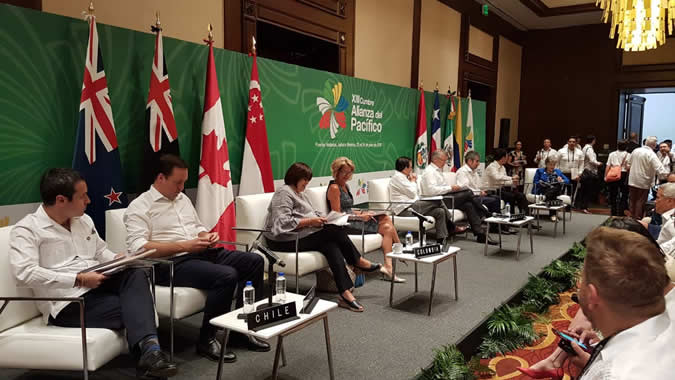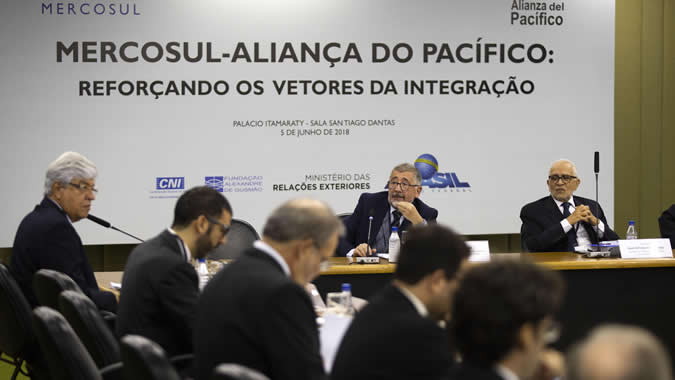ECLAC Reiterates Commitment to Supporting the Pacific Alliance and Praises Efforts Aimed at Convergence with MERCOSUR
Work area(s)
During the 13th ministerial summit being held in Puerto Vallarta, the organization’s Executive Secretary, Alicia Bárcena, also called for deepening the bloc’s relationship with Australia, Canada, New Zealand and Singapore.

The Executive Secretary of the Economic Commission for Latin America and the Caribbean (ECLAC), Alicia Bárcena, reiterated the institution’s commitment to supporting the Pacific Alliance and praised efforts aimed at convergence with the Southern Common Market (MERCOSUR), during the 13th Summit of authorities from the bloc that is made up of Chile, Colombia, Mexico and Peru, and which is being held in Puerto Vallarta (Mexico) through tomorrow, July 24.
The senior United Nations official also called on the countries of the group to deepen their relationship with Australia, Canada, New Zealand and Singapore, nations with which it is engaged in a negotiation process so they become part of the Alliance as associate States. Bárcena is participating in the Summit that has brought together Presidents from the Alliance’s four member countries: Sebastián Piñera (Chile), Juan Manuel Santos (Colombia), Enrique Peña Nieto (Mexico) and Martín Vizcarra (Peru), along with the Presidents of Brazil, Michel Temer, and of Uruguay, Tabaré Vásquez, who are attending as special guests.
In the framework of the meeting, which has also convened Ministers of Foreign Affairs, Trade and Finance from various countries of Latin America and other regions of the world, ECLAC’s Executive Secretary moderated today (Monday) a panel about the role of the Pacific Alliance as a promoter of free trade. She also spoke on Sunday, July 22, at a working dinner of Pacific Alliance ministers with representatives of international organizations (ECLAC; Inter-American Development Bank – IDB; Development Bank of Latin America – CAF; Organization for Economic Cooperation and Development – OECD; Latin American Integration Association – LAIA; and the Ibero-American General Secretariat – SEGIB).
Participants in the panel that took place today included the authorities from Pacific Alliance member countries María Lorena Gutiérrez (Minister for Trade, Industry and Tourism of Colombia); Ildefonso Guajardo (Secretary of Economy of Mexico); Rogers Valencia (Minister of Trade and Tourism of Peru); and Rodrigo Yáñez (General Director for International Economic Relations from Chile’s Ministry of Foreign Affairs); as well as ministers from the countries that are candidates for associate membership: Steven Ciobo (Minister of Trade of Australia); Pamela Goldsmith-Jones (Parliamentary Secretary to the Minister of International Trade of Canada); David Parker (Minister of Trade of New Zealand); and Chee Hong Tat (Senior Minister of State at the Ministry of Trade and Industry of Singapore).
In her welcome speech, Alicia Bárcena indicated that international trade is going through a very troubling time due to the imposition of numerous restrictions, which amount to just under $200 billion dollars (or the equivalent of 1% of global trade in goods). This figure could increase considerably if the United States goes ahead in September with an announced 10% increase in tariffs on $200 billion dollars’ worth of imports from China, and if that country responds in kind.
"If all these announced or potential restrictions are introduced, we could end this year with restrictions on US$ 1 trillion of imports worldwide, almost 6% of global trade in goods,” Bárcena said. “But perhaps more worrying than the actual numbers is the deterioration of the climate in which international trade is conducted. We see an erosion of the support and respect for the rules-based multilateral trading system embodied in the World Trade Organization (WTO), and a move towards power-based trade relations. This is a very negative development for all of us who support multilateral cooperation over unilateralism.”
ECLAC’s Executive Secretary agreed with various ministers about the need to respond to the growing questioning of free trade with an inclusive trade agenda that produces benefits for all sectors of society and also for the environment. This agenda must also be updated to adequately reflect the major technological changes that the global economy is undergoing, such as digitalization and robotization. In this sense, Bárcena highlighted the increasing inclusion of chapters on SMEs, gender and sustainable development in the most recent trade agreements signed by countries from the Pacific Alliance and by the candidates for associate membership.
During the panel discussion, the speakers also addressed the importance of the Pacific Alliance in the Asia-Pacific region and the challenges of the coexistence of various trade agreements, in particular between the Comprehensive and Progressive Agreement for Trans-Pacific Partnership (CPTPP), signed by 11 countries on March 8, 2018, and the potential agreement stemming from the Pacific Alliance’s negotiation with the States seeking associate member status. Three of the members of the Pacific Alliance are signatories of the CPTPP (Chile, Mexico and Peru), along with all four candidates for associate status.
In her remarks during the working dinner with ministers on Sunday, Bárcena indicated that the convergence between the Pacific Alliance and MERCOSUR is both “necessary and urgent,” above all in a context as turbulent as the current one. She recalled that together both blocs account for about 80% of the region’s population and GDP, close to 85% of its trade, and nearly 90% of its Foreign Direct Investment (FDI) flows. However, they trade very little among themselves: MERCOSUR represented in 2017 just 2.8% of the Pacific Alliance’s total goods exports and 4.0% of its imports. Meanwhile, in the same year, the Alliance was the destination for 6.4% of MERCOSUR’s total goods shipments and was the origin of 6.6% of its external purchases.
The international official indicated to the authorities in attendance that the convergence between both blocs must move from an exploratory phase to one that is oriented toward achieving sectoral agreements in areas of mutual interest. More specifically, she said that ECLAC proposes to work in five areas: greater regulatory cooperation and reduction of technical obstacles to trade; investment facilitation; mutual recognition of national Authorized Economic Operator programs; advancing toward a regional digital market; and cooperation on the development of statistics regarding trade in services.
During her participation in the 13th Pacific Alliance Summit, Alicia Bárcena put at the disposition of Presidents and Ministers ECLAC’s recent publication The Convergence between the Pacific Alliance and MERCOSUR: Facing Together a Challenging Global Scenario, which analyzes the current state of trade between both groups and the opportunities and challenges that it presents.
Related content

Deepening Regional Integration is an Imperative for Facing International Turbulence
A new publication by ECLAC indicates that convergence between the Pacific Alliance and MERCOSUR is “necessary and urgent.”

Convergencia entre la Alianza del Pacífico y el MERCOSUR es necesaria y urgente: CEPAL
Secretario Ejecutivo Adjunto a.i. del organismo, Mario Cimoli, participó en Brasilia en un seminario que analizó la importancia de profundizar los vínculos entre ambos bloques.
Subregional headquarter(s) and office(s)
Related link(s)
Country(ies)
-
Australia
-
Canada
-
Chile
-
Colombia
-
Mexico
-
New Zealand
-
Peru
-
Singapore
Contact
Public Information Unit
- prensa@cepal.org
- (56 2) 2210 2040